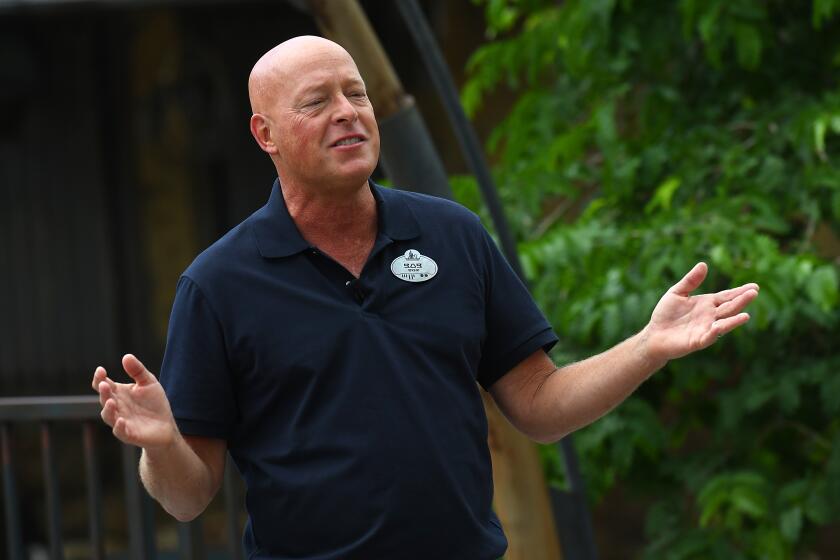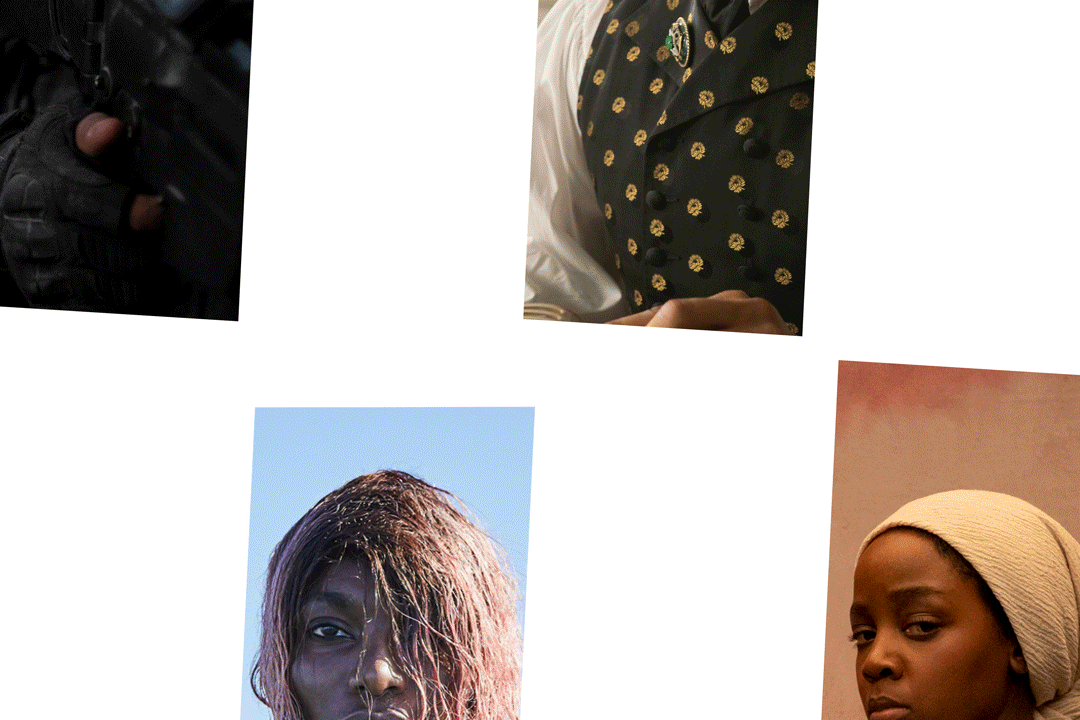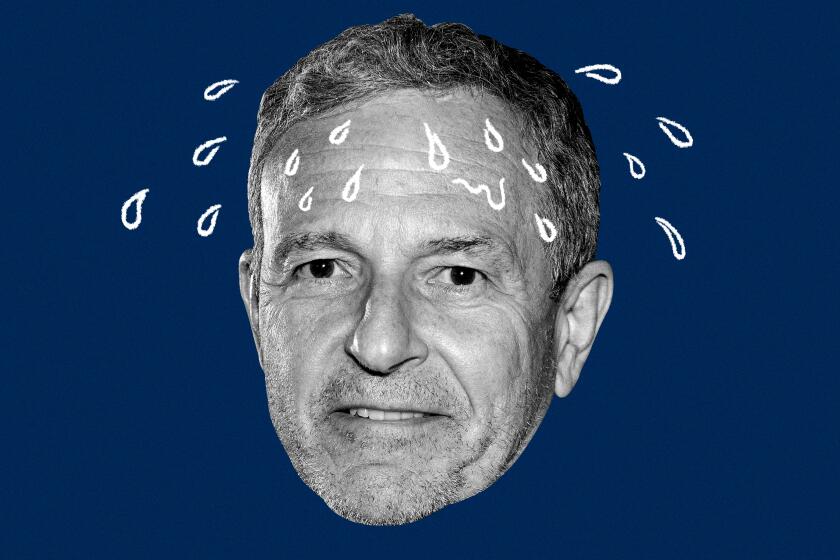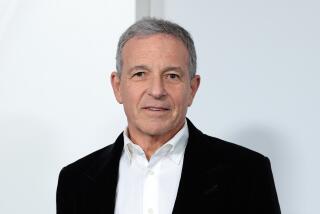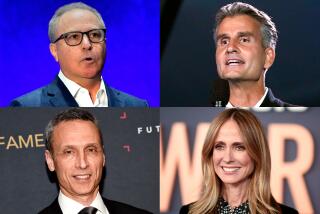‘Politics is bad for business.’ Why Disney’s Bob Iger is trying to avoid hot buttons

Disney’s chief executive emphasizes the company’s commitment to being “entertainment-first” during political challenges.
- Share via
- Disney acknowledged that a transgender athlete storyline had been removed from an upcoming Pixar animated series, “Win or Lose.”
- The decision was the latest sign of Chief Executive Bob Iger’s determination to keep Disney out of the culture wars.
Bob Iger wants out of the culture wars.
Walt Disney Co. and its chief executive have made a sharp pivot since doubling down on diversity and inclusion efforts in the wake of George Floyd’s murder in Minneapolis four and a half years ago. At the time, Disney’s top executives, including then-Chairman Iger, vowed in a message to employees: “We intend to keep the conversation going ... for as long as it takes to bring about real change.”
The Magic Kingdom dropped its pomp greeting to fans for its nightly fireworks display. “Good evening, ladies and gentlemen, boys and girls” became a gender-neutral salutation to “dreamers of all ages.” Pixar’s animated movie, “Lightyear,” included a brief kiss between two women characters; and Disney’s animated film, “Strange World,” featured the company’s first biracial queer teen hero.
But in the past week, Disney acknowledged that a transgender athlete storyline had been removed from an upcoming Pixar animated series, “Win or Lose,” about a middle-school softball team. In a statement, Disney said it recognized “many parents would prefer to discuss certain subjects with their children on their own terms and timeline.”
And Iger signed off on the settlement of a high-profile defamation lawsuit brought last spring by President-elect Donald Trump, amid howls from journalists that the owner of ABC News had caved to political pressure.
Disney agreed to pay $1 million for Trump’s legal fees and donate another $15 million for Trump’s future presidential library.
Trump sued ABC News and anchor George Stephanopoulos last spring after the journalist asserted during an on-air interview that a civil court jury had found Trump “liable for rape” in a case brought by advice columnist E. Jean Carroll. Instead, New York jurors determined Trump was liable for “sexual abuse.”

Some First Amendment experts believed ABC had a winning case, in part, because of a high hurdle for public officials to prove defamation.
The network “might well have prevailed if they had hung in there,” prominent journalist Margaret Sullivan wrote in a Substack opinion piece. “Instead, this outcome encourages Trump in his attacks on the press — and he needs no encouragement.”
Disney declined to comment for this story or make Iger available for an interview.
People close to the company, who were not authorized to comment, said Disney’s general counsel had recommended the settlement with Trump and that the decision to remove the transgender storyline from “Win or Lose” had been made months earlier.
A bruising fight with DeSantis
Disney’s retrenchment comes nearly three years after it found itself sinking in political quicksand.
In early 2022, Disney became a target for Florida Gov. Ron DeSantis after then-Chief Executive Bob Chapek waffled on a response to a Florida law aimed at preventing classroom discussions about sexual identity. Chapek’s instinct was to stay out of the fray and he initially defended the company’s initial silence, saying in a letter to Disney employees that corporate statements “do very little to change outcomes or minds.”
Such proclamations are “often weaponized by one side or the other to further divide and inflame,” Chapek wrote.
But after loud protests from employees and activists — and a Twitter post from then-retired Iger, who warned the Florida legislation “will put vulnerable, young LGBTQ people in jeopardy” — Chapek reversed course.
Chapek has faced criticism for issuing a statement in support of Ukraine but not the LGBTQ community in Florida. The CEO doesn’t want the company to be a “political football.”
DeSantis seized on Disney’s shifting stance and branded the company as “woke.”
In conservative circles, the pejorative label stuck.
“When you assign a private entity to a political team, then very quickly people will begin to view things in that light,” said Michael Binder, a University of North Florida political science professor who studied the Disney-DeSantis dispute.
Iger, who returned as chief executive two years ago to replace Chapek, recognized the existential threat.
“Our primary mission needs to be to entertain,” Iger said during the company’s 2023 investor meeting. “It should not be agenda-driven.”
The murder of George Floyd spurred entertainment companies to make sweeping commitments to racial justice. A Times survey shows where things stand.
Iger increasingly has stressed the importance of steering the company away from overt political messaging.
“The stories you tell have to really reflect the audience that you’re trying to reach but that audience, because they are so diverse ... can be turned off by certain things,” Iger said during an April appearance on CNBC. “We just have to be more sensitive to the interests of a broad audience. It’s not easy.”
The Burbank company has a hangover from its big streaming push. The stock has struggled, investors are restive and its key studios have been stretched.
Disney’s nearly two-year fight with DeSantis was bruising.
“DeSantis was using Disney as a political foil to make a case for his run for presidency,” said Binder, the director of University of North Florida’s Public Opinion Research Lab. “That was not something that we had seen before: Governors and elected officials outwardly attacking private companies, particularly a Republican going after a company.”
University researchers found DeSantis’ “woke” campaign against Disney had gained traction, at least among conservatives — despite the fact that Disney has long been one of Florida’s largest employers and a pillar of its tourism economy.
In a public opinion poll in early 2023 of Florida registered voters, the Public Opinion Research Lab found that only about 27% of Republicans in the state had a “favorable” view of Disney. Meanwhile, 76% of the Democrats polled were fans of the Mouse House.
“There was a huge split, and that’s not great for a company that’s trying to market to everybody,” Binder said.
Republican lawmakers closed ranks with DeSantis and Disney lost its unique land-use authority in Central Florida. Disney filed a First Amendment lawsuit the following year, arguing that DeSantis and state Republicans had waged a concerted campaign to punish Disney for exercising its speech rights to criticize Florida’s anti-LGBTQ+ legislation.
Earlier this year, a federal judge threw out Disney’s First Amendment lawsuit.
Disney settled with Florida, but the DeSantis episode brought into stark relief the hazards of promoting the company’s values to a global audience during polarizing times.
“Disney provides a product: entertainment,” said Charles Elson, a former director at the Weinberg Center for Corporate Governance at the University of Delaware. “It shouldn’t be about politics.”
Besides, Elson said, it becomes messy and costly for companies to extricate themselves after taking a political stand.
“When you get into politics, you are making a statement,” Elson said. “And when you get out, that also becomes a statement.”
Disney’s shareholder vote has become a contentious referendum on CEO Bob Iger, who has struggled to tame enormous problems that prompted his return in late 2022.
Iger has long championed Disney’s efforts to diversify its casts and storylines.
The 101-year-old company introduced its first Black princess in 2009. Nearly a decade later, it released the movie “Coco,” which was rich in Latino culture. Its 2018 Marvel film, “Black Panther,” became a juggernaut, earning $1.3 billion in global ticket sales.
The original “Moana,” which was inspired by Polynesian mythology, earned the mantle of most streamed movie on Disney+. The sequel, released over Thanksgiving weekend, has shattered box office records and has already raked in $750 million internationally.
“Our businesses create entertainment, travel and consumer products whose success depends substantially on consumer tastes and preferences that change in often unpredictable ways,” the company said in its most recent annual report.
“Consumers’ perceptions of our position on matters of public interest, including our efforts to achieve certain of our environmental and social goals, often differ widely and present risks to our reputation and brand,” the report added.
A cloudy defamation case
Disney has since joined a growing list of businesses that have opted to stand down rather than antagonize the president-elect — to the dismay of some First Amendment experts who believed Disney could have defeated Trump‘s defamation claims in the ABC News case.
Last year, a federal judge in Florida tossed out a lawsuit Trump filed against CNN, which sought $475 million in punitive damages. Trump claimed his reputation had been sullied by the network’s references to his efforts to overturn the results of the 2020 election as “the Big Lie.”
But defending Stephanopoulos’ statements may have been more fraught, according to people familiar with Disney’s internal deliberations.
The ‘Good Morning America’ co-host will remain with the program, which has recently fallen behind NBC’s ‘Today’ in the ratings.
Disney’s General Counsel Horacio Gutierrez and other high-level executives grew concerned after the judge in the case last July denied Disney’s motion to dismiss the case, according to one knowledgeable insider. In that ruling, U.S. District Judge Cecilia M. Altonaga wrote that “a reasonable jury could interpret Stephanopoulos’s statements as defamatory.”
Altonaga was appointed by former President George W. Bush.
Disney also figured it risky to present the case to a jury in South Florida, where Trump is particularly popular, the knowledgeable people said. Polls also have found a growing lack of trust in the news media.
An ‘entertainment-first’ company
Disney lawyers recognized that some legal conservatives might champion the case to the U.S. Supreme Court, where three Trump appointments sit. What’s more, U.S. Supreme Court Justice Clarence Thomas has expressed a desire to overturn the landmark New York Times vs. Sullivan court decision, which would have been at the heart of the ABC News case.
Disney didn’t want to jeopardize 60 years of press freedoms bestowed through that decision. Not to mention the harm to Disney’s and ABC’s image by trying to withstand Trump broadsides during his second term. CNN, in particular, sustained reputational damage after dueling with Trump, who labeled the cable news channel “fake news.”
“You don’t want to get in a fight with the head of a government that regulates you,” Elson said. “Politics is bad for business.”
Disney is trying to walk — but not cross — the line. During its meeting with shareholders earlier this year, Iger said he believes Disney has “a responsibility to do good in the world.”
“The Disney company can have a positive impact on the world ... fostering acceptance and understanding of ... people of all different types,” Iger told CNBC last spring. “But we need to be an entertainment-first company.”
More to Read
Inside the business of entertainment
The Wide Shot brings you news, analysis and insights on everything from streaming wars to production — and what it all means for the future.
You may occasionally receive promotional content from the Los Angeles Times.
